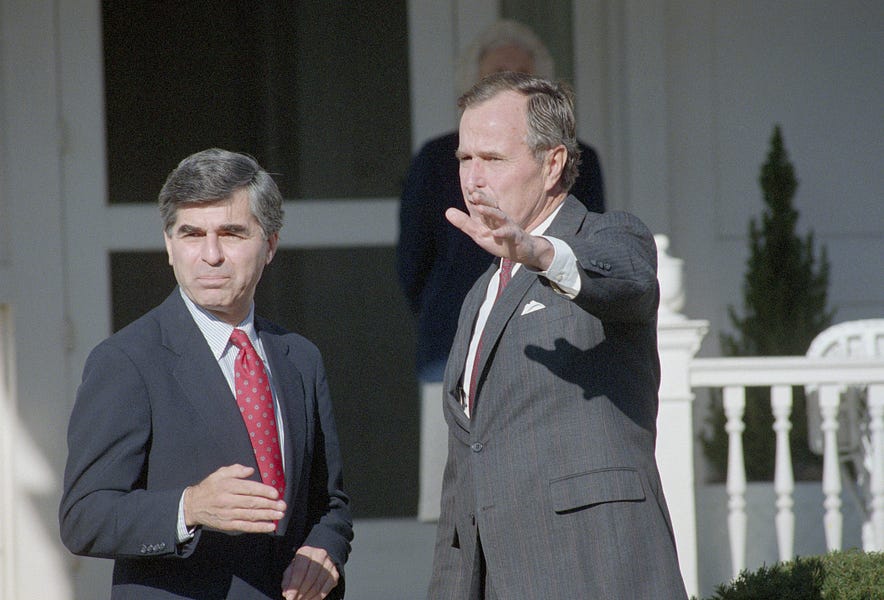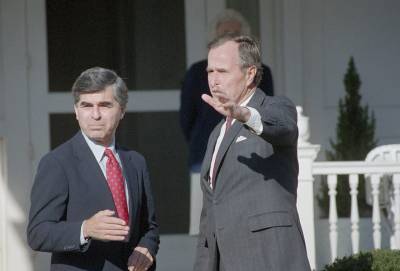In July 1988, Democratic presidential nominee Michael Dukakis enjoyed a 17-point lead against Vice President George H.W. Bush in a Gallup poll. But Bush went on to crush Dukakis, taking 40 states and winning by 7 percentage points. He did so by running an aggressive—critics would say demagogic—scorched-earth campaign against the then-Massachusetts governor.
It’s been fun to watch Republicans and Democrats alike invoke the Bush-Dukakis race this summer. It began with Republicans, when Trump’s poll numbers started to sink like a bulldog in a bathtub. Keep hope alive, Team Trump insisted. Bush came back from worse.
Now, with Trump’s slight recovery in recent polls and the start of the GOP convention—which, according to lore, initiated Bush’s ’88 comeback—Democrats have been pointing to the story as a “we can still blow this” cautionary tale. As if the party of Hillary Clinton, John Kerry, and Al Gore needed a 32-year-old history lesson on that score.
Over the weekend, Adam Nagourney of the New York Times offered a little for both sides with a long recap of that race, headlined: “A Glimmer of Hope for Trump? How Bush Mounted a Comeback in 1988.”
It’s an interesting read, but I’m not buying it, and not just because the 17-point Gallup poll was an outlier or even because the electorate today is much less white (85 percent in ’88, 71 percent in ’16) and much more liberal than it was back then.
Beyond basic generalities—polls can be ephemeral, campaigns can have comebacks, etc.—the contrast between 2020 and 1988, not to mention between Bush and Trump or Biden and Dukakis, makes the whole thing feel as forced and ridiculous as comparisons of, say, Trump and Winston Churchill.
Indeed, the only thing useful in the Biden-Dukakis comparison is to consider how much things have changed since 1988.
Sure, Biden is a flawed candidate, but his foibles aren’t those of Dukakis. The Massachusetts governor was a bloodless technocrat who famously couldn’t muster even hypothetical passion when asked in a debate what he’d do if his wife were raped and murdered. He was also relatively unknown to many voters and thus easily defined by the opposition. Say what you will about Biden, but most people think they know who he is after his eight years as vice president and more than 40 years in public life.
The more revealing contrast is on the GOP side. In 1988, Ronald Reagan had served two successful terms with high approval. Peace, prosperity, stability, and a nonviolent conclusion to the Cold War virtually screamed, “Stay the course!” Meanwhile, Trump seems keen on starting a new cold war with China. The economy was good before the pandemic, but that’s gone, and “stability” probably isn’t on anyone’s Trump-era bingo card.
For campaign strategists, the most striking contrast, tactically, is Bush’s strict message discipline compared with Trump’s shambolic self-indulgence. Bush stuck to his talking points so doggedly it became the fodder of “Saturday Night Live” skits. Trump can’t stick to a script even when Sean Hannity all but begs him too.
More significant were the context and content of Bush’s message. People have debated the GOP’s use (or abuse) of a law-and-order platform in the campaign that included a TV commercial blaming Dukakis for a vicious rape perpetrated by a felon who had been furloughed on his watch. But Bush’s reputation as a serious, patriotic, and responsible member of the moderate GOP establishment gave his broadsides heft.
Bush’s patriotic fervor may have seemed steroidal compared with his normally reserved demeanor, but it was philosophically aligned with a career of public service that began when he enlisted to become the youngest World War II Navy combat pilot. Having spent eight years as Reagan’s dutiful vice president, Bush had earned the mantle of loyal Reaganite. In short, he made himself a servant of a cause and a message larger than himself.
Trump can’t make himself a servant of a larger message because he is the message. He’s been governing as a culture war caricature from Day 1 of his presidency.
The contrast couldn’t be starker. Trump is running on a platform of Trumpism, but unlike Reaganism, there’s no consistent philosophical content to it. Absolute loyalty to Trump is all it demands, which is why, among other things, Trump wants to boycott Goodyear, praises dictators and ditched even the pretense of offering a GOP platform this week.
Trump can still win, but if he does, the victory won’t have parallels to the Bush-Dukakis campaign. It will be further evidence of how much American voters have changed since then.







Please note that we at The Dispatch hold ourselves, our work, and our commenters to a higher standard than other places on the internet. We welcome comments that foster genuine debate or discussion—including comments critical of us or our work—but responses that include ad hominem attacks on fellow Dispatch members or are intended to stoke fear and anger may be moderated.
With your membership, you only have the ability to comment on The Morning Dispatch articles. Consider upgrading to join the conversation everywhere.